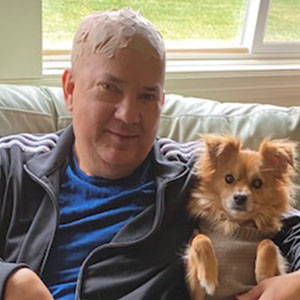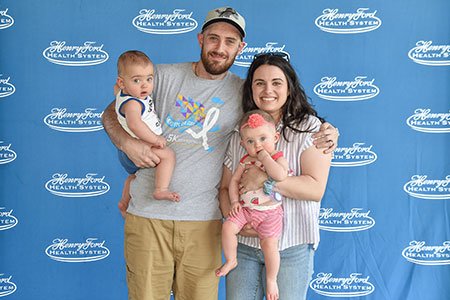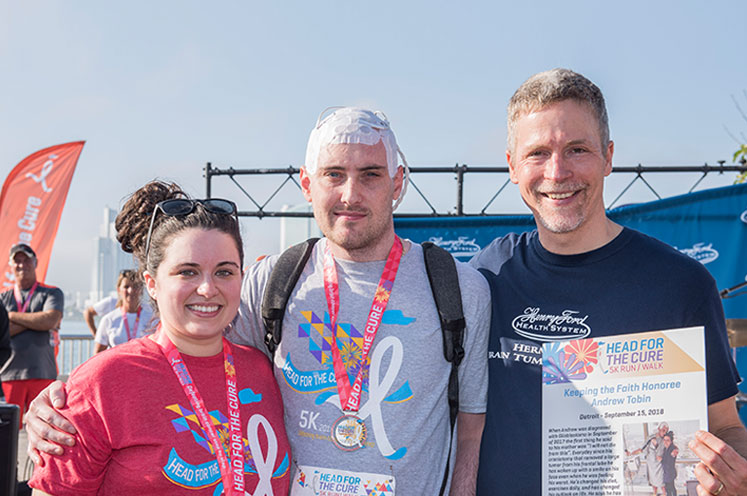Tumor Treating Fields
Andrew and Robert wear the tumor treating field device to extend their life. This device stops or slows the growth of tumor cells in patients with newly diagnosed glioblastoma.

Dr. Robert Gryebet was diagnosed with glioblastoma (GBM) in March 2019 and Andrew Tobin was diagnosed with glioblastoma in September 2017 – and both are being treated to fight this aggressive tumor with a wearable device.
Robert is a dentist who practiced in Sterling Heights, alongside his brother up until his diagnosis when he retired to focus on treatment and healing.
Andrew and his wife, Ashley, welcomed twins, Fiona Rae and Declan James, into the world just 18 months ago. Despite being treated for glioblastoma, he still works full time as a Quality Control manager at a local food production facility. Leading up to his diagnosis, Andrew checked into a local hospital with persistent migraines and came out more than a week later after a brain tumor was detected and an emergency craniotomy was preformed to remove it from his frontal lobe.
“At first, doctors thought the headaches were caused by tension,” he said. “When they discovered it was a brain tumor, I had the emergency surgery and then started looking at where I was going to go for treatment. I had always heard great things about Henry Ford and I’m very thankful I went there.”

While both men may not know each other personally, they are united in their fight against brain cancer as both are currently using an FDA-approved device called Optune®, which creates low-intensity, electric tumor-treating fields To deliver the fields, four transducer patches are applied to the scalp and connected to the battery-operated device. The low frequency current is thought to disrupt cell division in the tumor and may stop or slow the growth of cancer cells. In some cases, the tumor-treating fields may kill cancer cells.
“I’ve been wearing the device for about seven months now,” Robert said. “It’s recommended to wear it at least 75 percent of the time, but I’ve been wearing it even more than that. I’m a competitive guy. I’ve seen the stories of people who have lived years with GBM, and I’m determined to be in that club.”
As much of a difference as Optune makes for patients like Robert and Andrew, brain cancer treatment requires more than a physical effort, according to James Snyder, D.O., neuro-oncologist in the Department of Neurosurgery at Henry Ford Health.
“Having a positive attitude during treatment really does make a world of difference,” Dr. Snyder said. “Mr. Gryebet and Mr. Tobin are both diligent and consistent in wearing the Optune cap, which is hugely important, but even beyond that they maintain a mentality that they will stay strong as they go through treatment. Both are continuing to live their lives to the fullest.”
For these men, choosing the right team of healthcare providers has been a crucial part of their journey through GBM treatment.
“Whenever I’ve had a question regarding anything about GBM or my treatment, I run it by my care team and they are always extremely responsive. They are there for me every step of the way and having that support is invaluable. I can’t say enough about how much that means to me,” Robert said.
Andrew and Robert wear the tumor treating field device to extend their life. This device stops or slows the growth of tumor cells in patients with newly diagnosed glioblastoma.

We use cookies to improve your website experience. By using this site, you agree to our Terms of Use. Read our Internet Privacy Statement to learn what information we collect and how we use it.